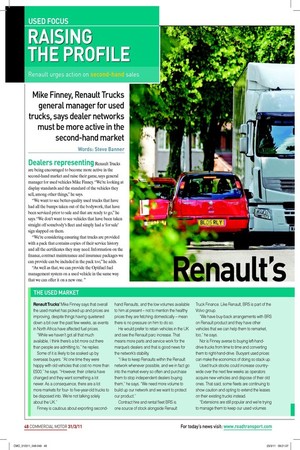THE USED MARKET
Page 38

Page 39

If you've noticed an error in this article please click here to report it so we can fix it.
Renault Trucks’ Mike Finney says that overall the used market has picked up and prices are improving, despite things having quietened down a bit over the past few weeks, as events in North Africa have affected fuel prices.
“While we haven’t got all that much available, I think there’s a bit more out there than people are admitting to,” he replies.
Some of it is likely to be soaked up by overseas buyers. “At one time they were happy with old vehicles that cost no more than £500,” he says. “However, their criteria have changed and they want something a lot newer. As a consequence, there are a lot more markets for fourto five-year-old trucks to be disposed into. We’re not talking solely about the UK.” Finney is cautious about exporting second hand Renaults, and the low volumes available to him at present – not to mention the healthy prices they are fetching domestically – mean there is no pressure on him to do so.
He would prefer to retain vehicles in the UK and see the Renault parc increase. That means more parts and service work for the marque’s dealers and that is good news for the network’s stability.
“I like to keep Renaults within the Renault network whenever possible, and we in fact go into the market every so often and purchase them to stop independent dealers buying them,” he says. “We need more volume to build up our network and we want to protect our product.” Contract hire and rental fleet BRS is one source of stock alongside Renault Truck Finance. Like Renault, BRS is part of the Volvo group.
“We have buy-back arrangements with BRS on Renault product and they have other vehicles that we can help them to remarket, too,” he says.
Nor is Finney averse to buying left-handdrive trucks from time to time and converting them to right-hand-drive. Buoyant used prices can make the economics of doing so stack up.
Used truck stocks could increase countrywide over the next few weeks as operators acquire new vehicles and dispose of their old ones. That said, some fleets are continuing to show caution and opting to extend the leases on their existing trucks instead.
“Extensions are still popular and we’re trying to manage them to keep our used volumes consistent,” says Finney. “I don’t want everything back this year and nothing back next year.” Most of the vehicles he handles are threeto five-years-old, and he is considering offering two-year buy-back deals to generate some used Renault stock come 2013.
While the new truck market is improving, poor registrations in recent years mean that there could be acute shortages of used models in the future. If a truck wasn’t sold new, then by definition it cannot be sold used.
Should Renault registrations show consistent improvement, then dealers could be faced with larger numbers of ex-contract trucks to dispose of as the decade wears on. Putting in the appropriate infrastructure now could pay dividends in the long run.
New truck prices have risen, but he does not believe that as a consequence large numbers of buyers who traditionally buy new are switching to late-plate second-hand.
“Remember that used prices have gone up as well, so if they’re shocked at the price of the new one, they’ll be shocked at the price of the used,” he observes. “And I still think that new and used are at heart different markets.” Is the London Low Emission Zone’s requirement for Euro-4 compliance from January 2012 boosting demand for trucks that meet the regulations? “It’s yet to achieve its maximum impact,” he says. “I think many operators who regularly go into the LEZ and know the change is going to happen believe that the cut-off date is further away than it actually is, and that in any event there will still be plenty of suitable trucks available closer to the time.” They could be disappointed of course and find themselves paying hefty daily fines as a result.
“Northern dealers are still willing to pay good money for Euro-3 trucks, but will not pay a premium for Euro-4 because many of their customers will never visit the LEZ,” he observes. “However, southern dealers are not interested in Euro-3, but will pay a lot of money for Euro-4. It’s a real north/south divide.”









































